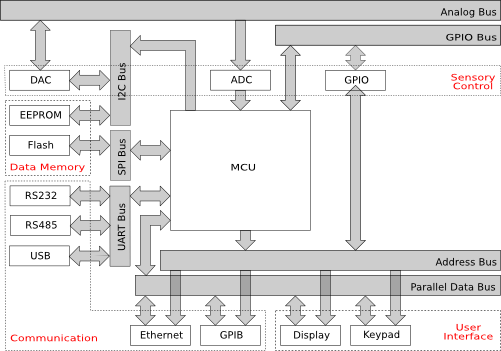Multi-purpose Embedded System
Hardware Architecture
- MCU
- MCU can be 8-bit/16-bit/32-bit
- MCU should have sufficient RAM (i.e. no external RAM required)
- MCU should have program Flash (i.e. no external program flash required)
- Data Memory
- Use serial bus (I2C/SPI) to expand data memory to save I/O pins
- Need a file system to access the data
- EEPROM for small block of re-writable data
- Flash for large block of re-writable data
- Communication
- RS232 for short distance one-to-one communication with PC
- RS485 for longer distance networked communication
- USB for USB communication with PC
- Ethernet for Internet connectivity
- GPIB for automated test equipment
- User Interface
- Graphical displays (LCD, VFD, etc.)
- Keypad for input
- Sensory Control
- ADC for analog feedback signals
- DAC for analog control signals
- GPIO for digital feedback and control signals
Software Architecture
RTOS
+-----------+-----------+----------------------------------------------+
Application | Task 1 | Task 2 | ... |
+-----------+-----------+------------+----------------------+----------+
Standard API | POSIX System Call | POSIX Thread | C-Lib |
+------------------+-----------------+----------------------+----------+
Kernel | Power Management | | Task Scheduler |
+------------------+ +----------+-----------+
| Drivers | FreeRTOS | Coroutine |
+------+-----+-----+-----+-----+-----+----------+-----------+
Hardware | UART | ADC | DAC | NVM | PWM | ... | TIMERS |
+------+-----+-----+-----+-----+-----+----------+
- The task scheduler is based on FreeRTOS V4.1.3 incorporating coroutine developed by Simon Tatham. The scheduler API is wrapped by the POSIX Thread API.
- e.g. pthread_create(), usleep(), etc.
- Software drivers are developed to allow users at Application Level to use the hardware (e.g. ADC, DAC, UART, NVM etc) through the POSIX System call API.
- e.g. open(), write(), read(), ioctl(), lseek(), etc.
- The most up-to-date development can be found at repository freertos_posix
